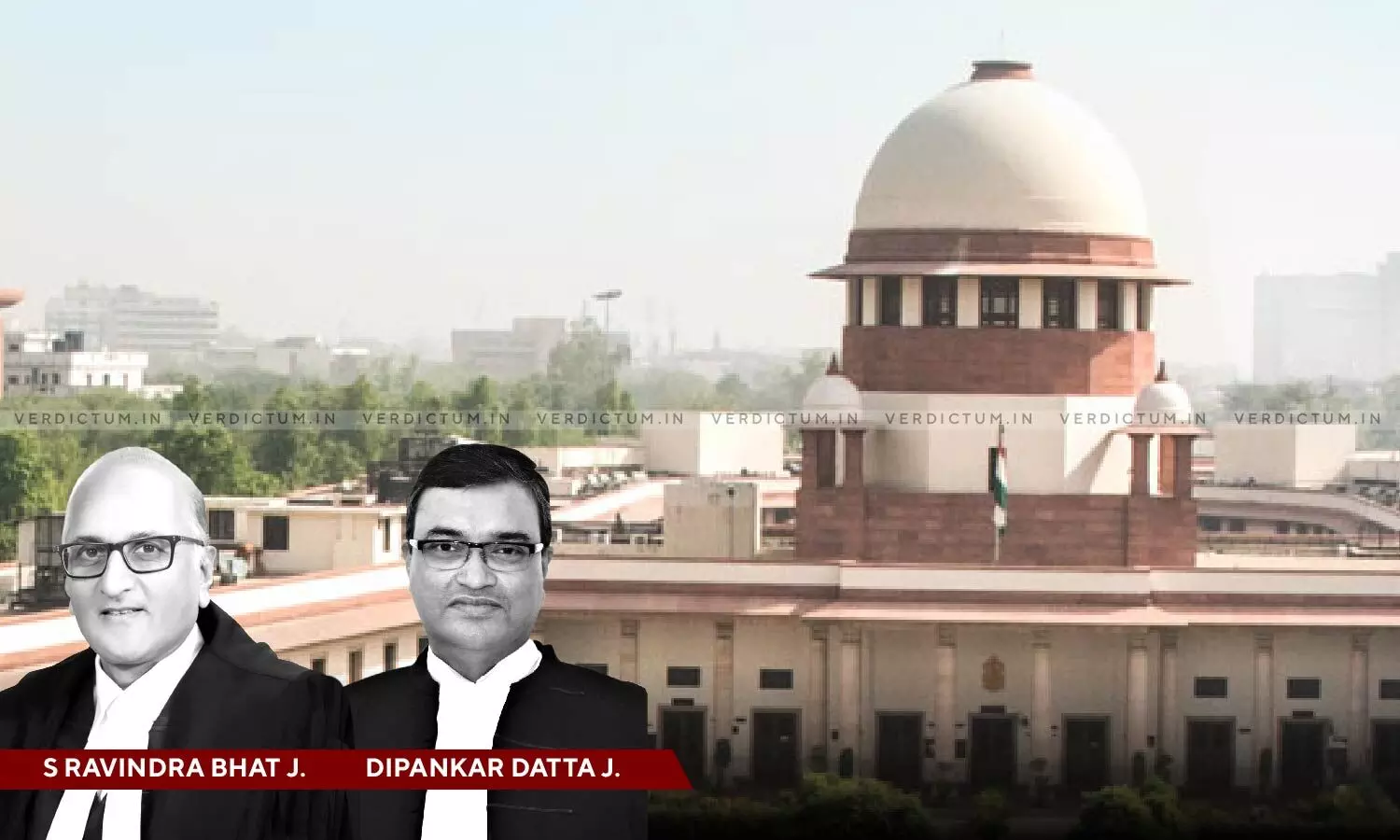
Desirable That Utterances Made In Public Are Outlined Before Subjecting Accused To Trial: SC In A Case Under SC-ST Act
 |
|The Supreme Court in a matter pertaining to the Scheduled Castes and Scheduled Tribes (Prevention of Atrocities) Act, 1989 has observed that it is desirable that utterances made by an accused within public view are outlined at least in the charge sheet before the person is subjected to trial under a provision of the Act.
The Bench of Justice S. Ravindra Bhat and Justice Dipankar Datta observed, "... it is desirable that before an accused is subjected to a trial for alleged commission of offence under section 3(1)(x), the utterances made by him in any place within public view are outlined, if not in the F.I.R. (which is not required to be an encyclopaedia of all facts and events), but at least in the charge-sheet (which is prepared based either on statements of witnesses recorded in course of investigation or otherwise) so as to enable the court to ascertain whether the charge sheet makes out a case of an offence under the SC/ST Act having been committed for forming a proper opinion in the conspectus of the situation before it, prior to taking cognisance of the offence."
The Court held that it will enable courts to ascertain whether the charge sheet makes out a case under the SC/ST Act, prior to taking cognisance of the offence.
The apex court was dealing with a matter in which a person was charge-sheeted for alleged offences, including under section 3(1)(x) of the SC/ST Act which deals with intentional insults or intimidation with intent to humiliate a member of a Scheduled Caste or a Scheduled Tribe in any place within public view.
The Bench held -
"The legislative intent seems to be clear that every insult or intimidation for humiliation to a person would not amount to an offence under section 3(1)(x) of the SC/ST Act unless, of course, such insult or intimidation is targeted at the victim because of he being a member of a particular Scheduled Caste or Tribe. If one calls another an idiot (bewaqoof) or a fool (murkh) or a thief (chor) in any place within public view, this would obviously constitute an act intended to insult or humiliate by a user of abusive or offensive language. Even if the same be directed generally to a person, who happens to be a Scheduled Caste or Tribe, per se, it may not be sufficient to attract section 3(1)(x) unless such words are laced with casteist remarks ”
AAG Ardhendhumauli Kumar Prasad appeared for the First Respondent State while AOR Vanshaja Shukla appeared for the Complainant before the Court.
In this case, an incident occurred in 2016 wherein the appellant engaged in an altercation with the second respondent regarding water drainage. It is alleged that during the altercation, the appellant verbally hurled caste-related abuses towards the complainant and his family members. Additionally, the appellant physically assaulted the complainant, resulting in multiple injuries. The charges framed against the appellant included sections 323, 504 of the Indian Penal Code (IPC) and Section 3(1)(x) of the SC/ST Act. The investigating officer filed the chargesheet the day after registering the FIR.
The Court noted that as per the prosecution's case, in January 2016, the appellant got engaged in an altercation with the complainant over drainage of water and it was alleged that the appellant had verbally hurled caste related abuses towards the complainant and his family members and also assaulted him.
The Bench held, "If one calls another 'bewaqoof' (idiot) or 'murkh' (fool) or 'chor' (thief) in any place within public view, this would obviously constitute an act intended to insult or humiliate by user of abusive or offensive language. Even if the same be directed generally to a person, who happens to be a Scheduled Caste or Tribe, per se, it may not be sufficient to attract section 3(1)(x) unless such words are laced with casteist remarks."
The Court also noted that Section 18 of the SC/ST Act bars invocation of the court's jurisdiction under section 438 of the Code of Criminal Procedure (CrPC), which deals with direction for grant of bail to person apprehending arrest, and the law has overriding effect over other legislations.
The Court which quashed the criminal proceedings against the accused, noted neither the FIR nor the charge sheet filed against him referred to the presence of a member of the public at the place of occurrence apart from the accused, the complainant and his two family members.
The Bench observed since the utterances, if any, made by the appellant were not "in any place within public view", the basic ingredient for attracting section 3(1)(x) of the SC/ST Act was missing or absent.
The Bench noted the FIR and the charge sheet made no reference to the utterances of the appellant during the course of verbal altercation or to the caste to which the complainant belonged, except for the allegation that caste-related abuses were hurled.
The appellant had approached the High Court seeking quashing of the criminal proceedings on the grounds that the charge sheet disclosed no offence and the prosecution was instituted with mala fide intention for harassment.
"Completion of investigation within a day in a given case could be appreciated but in the present case it has resulted in more disservice than service to the cause of justice," the Bench said while setting aside the High Court's order.
Cause Title- Ramesh Chandra Vaishya v. The State of Uttar Pradesh & Anr.
Click here to read/download the Judgment